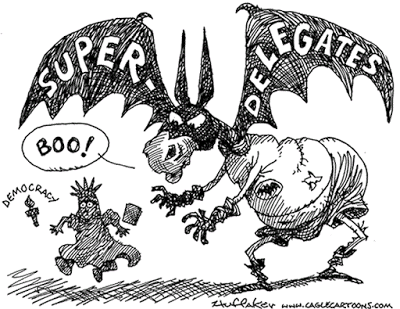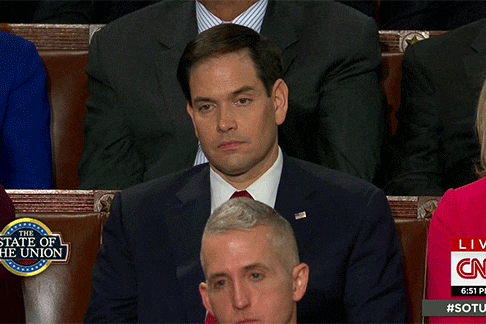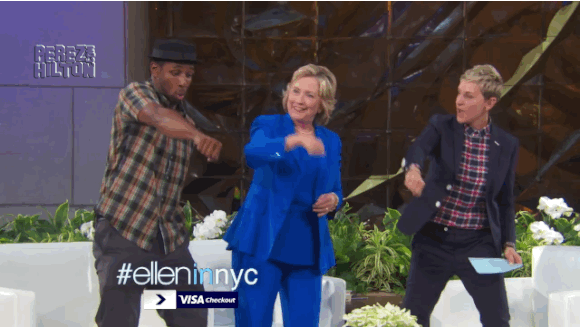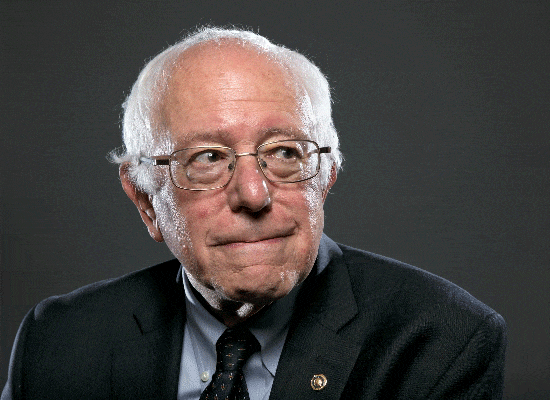After Bernie Sanders' win in the New Hampshire Primary, the talk has changed from folks in New Hampshire feeling the Bern, to Hillary Clinton not really losing after all due to support from superdelegates.
You might be wondering: what the f**k is a superdelegate? And how did Hillary Clinton secure so many?
Before we get into the nitty gritty about superdelegates, let's rewind for a second and review the delegate. A delegate is a person who represents a particular candidate and casts a vote for that candidate at the national party conventions, ultimately deciding the party's nominee for the general election.
There are two types of delegates: pledged delegates and superdelegates.
Pledged delegates are distributed based on how many votes the candidates receive in the primary contests. In primaries, the number of delegates allotted to each candidate represents the proportion of votes a candidate receives. The delegates are pledged to vote for those candidates at the nominating convention and cannot change their votes. In caucuses, the number of delegates allotted to each candidate depends. In Republican caucuses, the number of delegates allotted to each candidate represents the proportion of votes a candidate receives, just like in the primary system. The Democratic caucuses function a little differently. The initial delegates are allocated based on the proportion of votes a candidate receives at the caucus, but these delegates don't go straight to the party convention. They go to a county caucus, where they are allocated again based on voting, and then they eventually go to a state caucus, where they are yet again allocated based on voting. This last caucus determines the number of delegates allotted to each candidate.
Superdelegates are unelected delegates (that's right; the people don't choose them) who are free to support any candidate for their party's nomination that they want to. They don't have to abide by anyone's preferences but their own. They are typically political office holders and party leaders, but not always. Fun fact: superdelegates only exist on the Democratic side of the race; though there are some unpledged delegates on the Republican side, the Republican National Committee typically obliges them to vote in proportion to primary results, like pledged delegates are required to do, so they are not really considered superdelegates. Another fun fact: superdelegates can change their mind if they want to, so if they prefer one candidate for awhile, but then change their mind, they can do that, and vote for a different candidate.
Criticisms of Superdelgates
Though they can be helpful in making sure the people's preferences are being heard when the people's preferred candidate differs from the candidate the party prefers, not everyone is a fan of their existence for the fact that they can undermine democracy a bit. A common criticism is that superdelegates have the potential to sway the results to nominate a candidate that doesn't receive the majority of votes, since there are hundreds of them, and they don't have to answer to anyone's preferences but their own. That means if, for example, the people prefer Bernie and he receives the majority of the popular vote, Hillary could theoretically win the Democratic nomination if she receives overwhelming support from the superdelegates. The same persists if the situation is reversed.
***End of poly sci lesson for today.***
Why does Clinton have so many?
There's a couple of reasons why Hillary Clinton is raking in superdelgates like it's nothing. One, she's the party's preferred candidate, for many different reasons, which is a conversation for another day. What I mean by that is every party typically has a candidate that they prefer, and to ensure they get elected, they allocate resources and support around that candidate to help them perform better in the primary contests. This is a phenomenon that political scientists Marty Cohen, David Karol, Hans Noel, and John Zaller refer to as the "invisible primary" in their book, "The Party Decides: Presidential Nominations Before and After Reforms." Side note: I recommend checking out this book, especially since the theory isn't really holding up very well in this election cycle, which is rather unusual. Superdelegates may be helpful in securing the nomination for her if she gets enough of them supporting her, as she could theoretically win without securing the majority vote, if that were to occur.
Two, she's been in the presidential race before and is a well-known member of the Democratic party. Bernie Sanders, though running on the Democratic ticket, has served as an Independent politician for a long time, and he identifies himself as such. Hillary Clinton has spent years building relationships with people in the Democratic circle because she's been around them for so long not only in her political capacities but also when she served as first lady to Bill Clinton in his political capacities. She's a seasoned, experienced, long-time Democrat. Sanders doesn't have as many connections within the Democratic party, so in order to secure those superdelegates, it's going to be a lot of work on his end, with his supporters showing up and presenting him as a real competitor. Superdelegates who start to view him as a real competitor may switch sides.
What can you do?
Vote! Caucus! Primary! Make sure you turn out for your preferred candidate, whoever that may be. By turning out, you have the ability to help ensure that the pledged delegates are allocated to your candidate, and you have the potential to make superdelegates notice your candidate, influencing them to stay where they are at or switch sides. When you stay home, your candidate loses, regardless of who you support, so make sure to look up the dates of your local caucus/primary, check out the requirements (registered with a certain party, etc.), location, all the deets. Don't stay home!

























